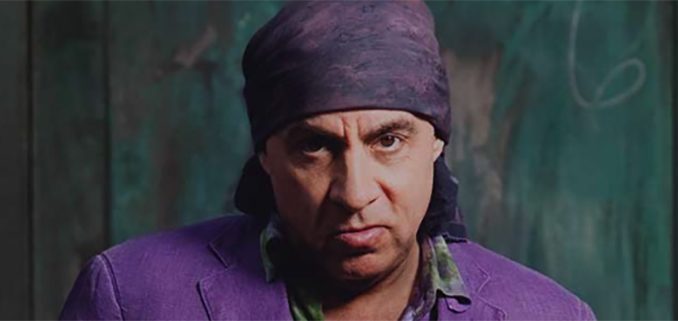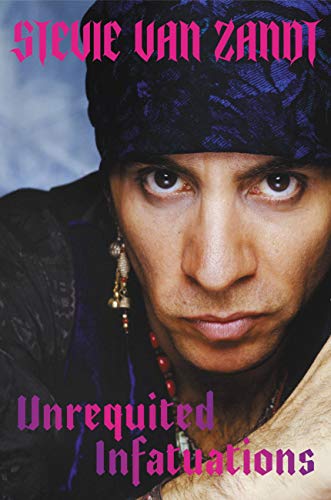
By Jeff Jenkins.
“A masterpiece is a thousand good guesses.”
19 Things We Learned from Little Steven’s Book
“That’s why artists became artists, wasn’t it? To make order out of the chaos? To impose a rationale on the irrational? To answer the unanswerable questions?”
Steven Van Zandt is a great artist. If you need proof, just check out ‘I Am A Patriot’, his song that’s been covered by Jackson Browne, or ‘Sun City’, one of the greatest protest songs of all time.
And, of course, Van Zandt – aka Miami Steve and Little Steven – is Bruce Springsteen’s right-hand man in The E Street Band, star of The Sopranos and Lilyhammer, host of the radio show Little Steven’s Underground Garage, and an astute record producer (Darlene Love, Gary US Bonds, Southside Johnny).

Van Zandt has just released his autobiography, Unrequited Infatuations. Springsteen calls it “a must-read for E Street Band fans and rock fans the world over”, while Bob Dylan says it’s “a cautionary tale filled with outrageous humour, worldly wisdom, and an uncanny sense of daring”.
In the finely crafted memoir, Van Zandt writes: “Art can provide insight, inspiration, motivation, even information, but at the very least it communicates you are not alone.”
Here are 19 things we learned from the book:
Little Steven loves bands … “I obviously had some genetic penchant for metaphysical zealotry. A need to be part of something larger.” He dug West Side Story. “For me, gangs weren’t about conflict or competition. They spoke to my natural impulse to belong to something.” Seeing The Beatles on The Ed Sullivan Show changed everything. “A band communicated something different from what an individual communicated. An individual was all about me, me, me … bands communicated Friendship. Family. The Gang. The Posse. The Team. The Squad. And ultimately, the Community.”
He loved The Beatles, but the Stones changed his life … “Mick Jagger didn’t smile. I suddenly understood. I didn’t have to be perfect. Or even happy! Just look at them … [The Beatles] were conventionally attractive. The Stones were more primitive. They were the first punk band. The Beatles showed us a new world; the Rolling Stones invited us in.”
His first acid trip shaped his world view … “I know it’s probably hard to believe now, but my generation didn’t do drugs to escape from reality. We were seeking enlightenment. Acid affected the mind in ways that gave the user a shortcut to understanding the basics of Eastern philosophy. Think of it as the hippie Google. The first [trip] revealed to me the three truths that remain the basis of my spiritual knowledge to this day: Everything is alive. Everything is connected. Everything is forever.”
The origins of two great nicknames … After a gig with Dion, he fell in love with Miami and started wearing Hawaiian shirts and Frank Sinatra/Sam Snead hats. When he returned to New Jersey, Springsteen started calling him “Miami Steve”. Later, as he embarked on a solo career, he reflected on what was needed in rock ’n’ roll. “There is an essential element of Fantasy. Of Mystery. Of Masquerade. Theatre! And so I became Little Steven.” He was inspired by Little Anthony, “one of my favourite doo-wop singers”; Little Walter, “my favourite blues guy”; and Little Richard, “the embodiment and archetype of the philosophy of rock and roll freedom … As Little Steven, I would become the Political Guy, and release and embody my inner ’60s gypsy forevermore.”
He tried to get Bruce to change the name of his band … “He had started calling it the E Street Band, which I didn’t get. Not only did it have no real resonance or meaning, but it was named after the street where Davie Sancious’s parents lived – a guy who was no longer in the band.” Their softball team at the time was called the E Street Kings, which combined the band name with a line in ‘Backstreets’ (“We sat with the last of the Duke Street Kings, huddled in our cars”). “I tried to talk Bruce into changing the band name to follow the lyrics. How much cooler would that have been? Bruce Springsteen and the Duke Street Kings!”
He made the bandana famous in rock, years before Axl Rose … “My favourite TV show was Zorro. Did that influence my look with the bandana? Probably.” After a car accident, his hair didn’t grow back properly. “I asked Bruce what he thought. ‘You’ve been wearing these bandanas,’ he said. ‘Just make it a thing.’ I did.”
He hates the sound of ’70s records … “The ’70s were the worst time in history to record. Virtually every record sounded great in the ’50s and ’60s, and they would sound great again in the ’80s and beyond. But in the ’70s most recorded music sounded weird. Artificial. Claustrophobic.”
Columbia thought about dropping Springsteen – even after ‘Born To Run’ … “John Hammond had been moved aside, and Clive Davis had gotten bounced after some stupid scandal. The label was sending promotion men into radio stations to take Bruce’s records out and put in records by their new kid, Billy Joel. No shit.”
Darkness On The Edge Of Town was a difficult record to make … “We all briefly became drug addicts on this one. Except Bruce. He was the only guy I knew who never did drugs. He had his own vice, which was mentally beating the shit out of himself.”
He sped up the vocals on ‘Hungry Heart’ … “Bruce just didn’t have a pop voice … For a song to be a hit, it has to sound like a hit. Ideally, it’s a bright, uplifting sound that appeals to a pop audience that will respond to the ear candy far more readily than the actual substance. So how could we make the record brighter in general? And then it hit me. Speed the tape up! His big voice would become smaller. Thinner. Younger! Remember the Chipmunks? Same science, taller Artist.”
After working with Gary US Bonds, he wanted to start a label, producing and releasing only ’60s artists … “I told Bruce we should start a label and do nothing but that – and buy the Power Station to do it. We could have done it with Sony money, given them distribution. Game over! He was tempted, I could tell. But he couldn’t stand the thought of being in a business of any kind. It’s a shame. Can you imagine what great records we could have made? Not just with Ben E. King and Chuck Jackson, but with Wilson Pickett, David Ruffin, Little Richard, and who knows who else?”
He regrets quitting the E Street Band just before Born In The U.S.A. … “As Chadwick Boseman, playing James Brown, says in the excellent biopic Get On Up after he fires his band, ‘Five minutes ago, you were the baddest band in the land; now you’re nobody.’ Let that be a lesson, kids. And believe me, I am nothing if not the cautionary tale. Never, ever leave your power base. Not until you have secured a new one.”
But he continued to give Bruce advice … “He played me one song called ‘Dancing In The Dark’ that was going on the record, and then ‘No Surrender’, which he said would be an out-take for a B-side. ‘Man,’ I said, ‘you got it backwards! Throw that ‘Dancing In The Dark’ thing in the trash and not only put ‘No Surrender’ on the record, but open with it! In fact, make it the damn title! No Retreat, No Surrender!”
‘Sun City’ would never have happened if not for Peter Gabriel, an artist he’d never heard of … “I was in Los Angeles in 1983 and went to an art theatre on Melrose, to see Jean-Luc Godard’s Breathless. Before the movie started, a song was playing. It was different somehow, oddly evocative. After the movie, I knocked on the projectionist’s door and asked him what it was. ‘Peter Gabriel,’ he said. ‘Biko.’ I had never heard of either of them.”
He’s not a fan of Paul Simon … “Famous liberal Paul Simon once cornered me at a party and asked how I could be supporting this Mandela character when he was obviously a Communist. ‘Really, Paulie?’ I said. ‘You sure?’ ‘Yes,’ he said. ‘My friend Henry Kissinger explained it all to me. Just follow the money!’” Simon denies this conversation ever took place.
Zappa knocked back the offer to sing on ‘Sun City’ … “Frank Zappa answered the phone. ‘Hi,’ I said, introducing myself. ‘We’re making a solidarity statement about what’s going on in South Africa and …’ That was all I got out.” Zappa said: “Why would I want to participate in your meaningless bullshit record when all that’s going to happen is that you are going to steal the publishing money? I don’t want to hear it. I’ve heard it all before!”
Rock died with Kurt … “I clock the rock era from ‘Like a Rolling Stone’ in 1965 to Kurt Cobain’s death. Thirty years of universal bliss. Cobain marked the last time an audience would invest in an artist emotionally to that degree.”
HBO wanted to change the name of The Sopranos … “They thought the audience would assume the show was about the opera. ‘That’s ridiculous!’ I told [creator David Chase]. ‘Tell those fools names become the content. What’s the stupidest name of a band you’ve ever heard? The Beatles! What’s the second dumbest? The E Street Band! But nobody thinks they’re so dumb anymore now, do they?’”
He is, unsurprisingly, not a Trump fan … “I am compelled to thank the Trump Kakistocracy,” he says, stingingly, in the book’s acknowledgments, “the most extraordinarily incompetent, malevolent, ignorant and embarrassing government in history for providing the nine months of quarantine that allowed me to give birth to this unlikely fable.”
Unrequited Infatuations by Stevie Van Zandt (Hachette)

